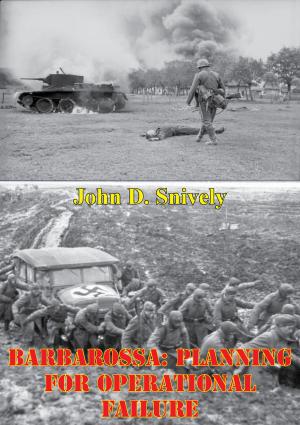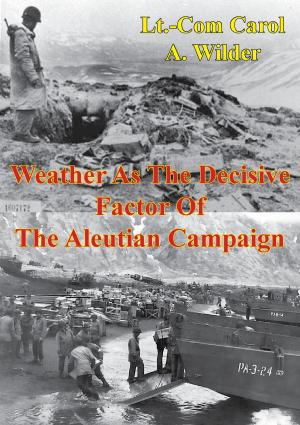Forest Brothers, 1945: The Culmination Of The Lithuanian Partisan Movement
Nonfiction, History, Germany, European General, Military, United States| Author: | Major Vylius M. Leskys | ISBN: | 9781786250650 |
| Publisher: | Verdun Press | Publication: | November 6, 2015 |
| Imprint: | Verdun Press | Language: | English |
| Author: | Major Vylius M. Leskys |
| ISBN: | 9781786250650 |
| Publisher: | Verdun Press |
| Publication: | November 6, 2015 |
| Imprint: | Verdun Press |
| Language: | English |
Although the resistance effort maintained its strength ideologically, the Lithuanian partisan movement never recovered from the culminating point in 1945 because of a shortfall in resources, a lack of external support, and the inability of resistance leadership to adapt rapidly enough against a comprehensive Soviet assimilation campaign.
While many authors argue that the high point in the Lithuanian partisan war occurred between 1946 and 1947, the totality of evidence points towards a culmination in 1945 from which the effort never recovered. This culminating point may be attributed to a miscalculation of partisan resources on the part of their leadership as well as a lack of external support. The main reason for achieving culmination, however, rested in the inability of partisans to fight a conventional war against a massive, combined arms Soviet force. Mass deportations between three separate occupations and a wave of 60,000 escapees created a vacuum of political, military and moral leadership. Compounded with the realization that there would be no external support from the democratic West, the will of the Lithuanians was bent by the Soviet campaign. Ultimately, the numbers of partisans killed, captured or given amnesty by Soviet forces reflect an apex in military capability in 1945 that drastically diminished thereafter.
The pinnacle of partisan effort in 1945 clearly represents a culminating point that forced the Lithuanian resistance movement to shift their operations drastically. Ultimately, based on the totality of evidence, the 1945 culminating point splits the resistance into two stages: 1) 1944-1945-conventional war operations, a period of traditional offensive warfare by an organized partisan movement; and 2) 1946-1953-irregular warfare operations, a period of unremitting decline by a significantly diminished resistance, relegated to a more defensive posture and small scale offensive operations.
Although the resistance effort maintained its strength ideologically, the Lithuanian partisan movement never recovered from the culminating point in 1945 because of a shortfall in resources, a lack of external support, and the inability of resistance leadership to adapt rapidly enough against a comprehensive Soviet assimilation campaign.
While many authors argue that the high point in the Lithuanian partisan war occurred between 1946 and 1947, the totality of evidence points towards a culmination in 1945 from which the effort never recovered. This culminating point may be attributed to a miscalculation of partisan resources on the part of their leadership as well as a lack of external support. The main reason for achieving culmination, however, rested in the inability of partisans to fight a conventional war against a massive, combined arms Soviet force. Mass deportations between three separate occupations and a wave of 60,000 escapees created a vacuum of political, military and moral leadership. Compounded with the realization that there would be no external support from the democratic West, the will of the Lithuanians was bent by the Soviet campaign. Ultimately, the numbers of partisans killed, captured or given amnesty by Soviet forces reflect an apex in military capability in 1945 that drastically diminished thereafter.
The pinnacle of partisan effort in 1945 clearly represents a culminating point that forced the Lithuanian resistance movement to shift their operations drastically. Ultimately, based on the totality of evidence, the 1945 culminating point splits the resistance into two stages: 1) 1944-1945-conventional war operations, a period of traditional offensive warfare by an organized partisan movement; and 2) 1946-1953-irregular warfare operations, a period of unremitting decline by a significantly diminished resistance, relegated to a more defensive posture and small scale offensive operations.





![Cover of the book Condition Red; Destroyer Action In The South Pacific [Illustrated Edition] by Major Vylius M. Leskys](https://www.kuoky.com/images/2015/november/300x300/9781786252623-ExZ1_300x.jpg)
![Cover of the book T. E. Lawrence: Theorist And Campaign Planner [Illustrated Edition] by Major Vylius M. Leskys](https://www.kuoky.com/images/2014/august/300x300/9781782894308-l8rb_300x.jpg)
![Cover of the book Samurai! [Illustrated Edition] by Major Vylius M. Leskys](https://www.kuoky.com/images/2014/august/300x300/9781782898382-n6aB_300x.jpg)




![Cover of the book Marines In World War II - Iwo Jima: Amphibious Epic [Illustrated Edition] by Major Vylius M. Leskys](https://www.kuoky.com/images/2014/august/300x300/9781782892847-K6Mq_300x.jpg)


